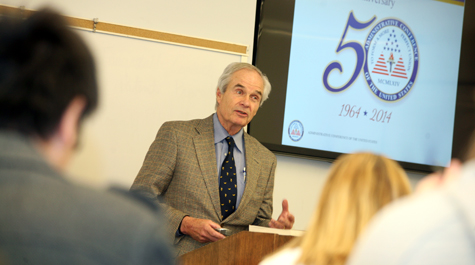Learning About ACUS from Chairman Paul Verkuil
On Thursday, February 12, Paul Verkuil, chairman of the Administrative Conference of the United States (ACUS), spoke to students and faculty from the Law School and the Thomas Jefferson Program in Public Policy. The talk was a homecoming for Verkuil, a 1961 graduate of the College of William & Mary and president of the college from 1985 to 1992. During his tenure as president, he launched the graduate program in public policy and taught classes at the law school. In 2010, he was appointed to lead ACUS by President Barack Obama. Matthew Lee Wiener, B.A. '91, ACUS executive director, and Reeve T. Bull, ACUS attorney advisor, joined Verkuil for the event.
ACUS is a federal agency designed to improve the administrative functions of the federal government. Verkuil called ACUS the federal government's "in-house think tank" that recommends operating and rulemaking policies to federal agencies with the goal of promoting a more integrated and efficient regulatory scheme. "The biggest problem in government is coordination between agencies," he said. He added that through its initiatives ACUS is making strides to correct the problem, noting that ACUS enjoys bipartisan support for its mission.
Verkuil detailed one initiative currently underway called retrospective review, a process by which agencies review existing rules for effectiveness and consistency with regulations enacted by other agencies. Review processes have been developed independently within some agencies, but ACUS hopes, he said, to recommend procedures that all agencies can follow. ACUS experts see the ability to harness big data from public and private sources as a potential tool to measure the impact of federal regulations in meaningful ways that were not possible just a few years ago.
Retrospective review has been a component of efforts to coordinate internationally as well. Bull spoke about regulatory coordination efforts in the ongoing negotiations of the U.S.-E.U. Transatlantic Trade and Investment Partnership. Just as federal agencies can better coordinate their regulatory rules to create a consistent regulatory framework for a given industry, he said, America and its trading partners can look to one another's rules to see which foreign regulations might be beneficial if adopted as common policies among nations.
ACUS does not expect to transform government overnight, but Verkuil presented a hopeful vision for the future. Key to this vision, he said, are the generation of young leaders coming to work for the government today who have the ideas and ingenuity needed to effectuate reforms.
About William & Mary Law School
Thomas Jefferson founded William & Mary Law School in 1779 to train leaders for the new nation. Now in its third century, America's oldest law school continues its historic mission of educating citizen lawyers who are prepared both to lead and to serve.
